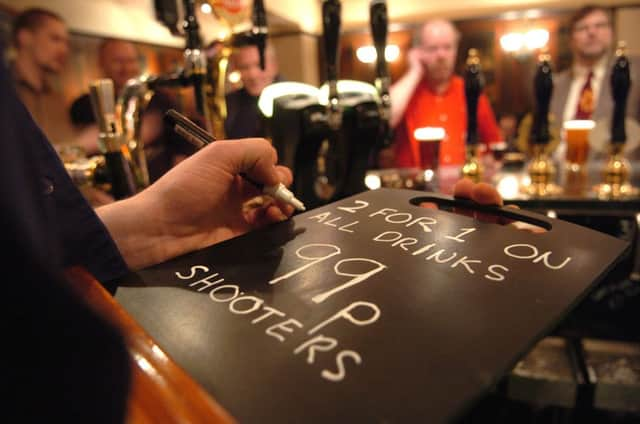Over a third of Scots admit to binge drinking


Over a third (36 per cent) of people in Scotland reported that they drank more than eight units of alcohol in a heavy drinking day in the week before being interviewed, a study by Office for National Statistics (ONS) researchers.
This compares with less than a quarter in the south of England, the Midlands and Wales.
Advertisement
Hide AdAdvertisement
Hide AdNorth-east England has a similar proportion of binge drinkers to Scotland, followed by north-west England (32 per cent) and Yorkshire and the Humber (30 per cent).
But Scotland also has one of the highest proportions of adults who say they do not drink at all (21 per cent), behind London (32 per cent), the West Midlands (25 per cent) and Wales (22 per cent).
The ONS said: “Young adults are commonly associated with binge drinking in the media. However, the latest data about their relationship with alcohol might surprise you, as might the location of the teetotal capital of Great Britain.
“More than one in five adults in Great Britain in 2013 said they were teetotal. The proportion of teetotal young adults (those aged 16 to 24) increased by over 40 per cent between 2005 and 2013.
“The proportion of adults who binged at least once in the previous week decreased from 18 per cent in 2005 to 15 per cent in 2013. This is because the proportion of young adults binge drinking fell by more than a third since 2005, from 29 per cent to 18 per cent.
“In 2013 only one in 50 young adults were frequent drinkers, drinking on five or more days in the week before interview, a fall of more than two-thirds since 2005.
“Almost a third of adults in London (32 per cent) said that they do not drink alcohol at all. This was considerably higher than any other region of Great Britain.
“Around a third of adults in Scotland and the north of England, who drank in the previous week, had binged at least once, compared with less than a quarter of those in other parts of Great Britain.
Advertisement
Hide AdAdvertisement
Hide Ad“In line with the government’s alcohol strategy, binge drinking refers to men who reported drinking more than eight units of alcohol on their heaviest drinking day in the week before interview, and women who drank more than six units.”
The ONS said a clampdown on off-licences, bars and supermarkets selling alcohol to under-21s may have contributed to the fall in drinking among young people.
But MPs have previously pointed to the growing migrant population, including a large proportion of Muslims who do not drink, as a contributing factor to the closure of traditional neighbourhood pubs.
The report’s lead statistician Dr Craig Orchard said: “Young people are still the age group that binge drink most, it is just they are doing less of it. We do not know the reasons for this.
“There could be cultural changes going on, but we cannot back that up with statistics because we did not ask people what their background was.
“London, for example, has the highest ethnic diversity anywhere in the country so this may be linked to it having more teetotallers than anywhere else.”
But drinking still remains the No1 cause of death among younger people in Britain despite research showing a dramatic fall in consumption, Alcohol Concern said.